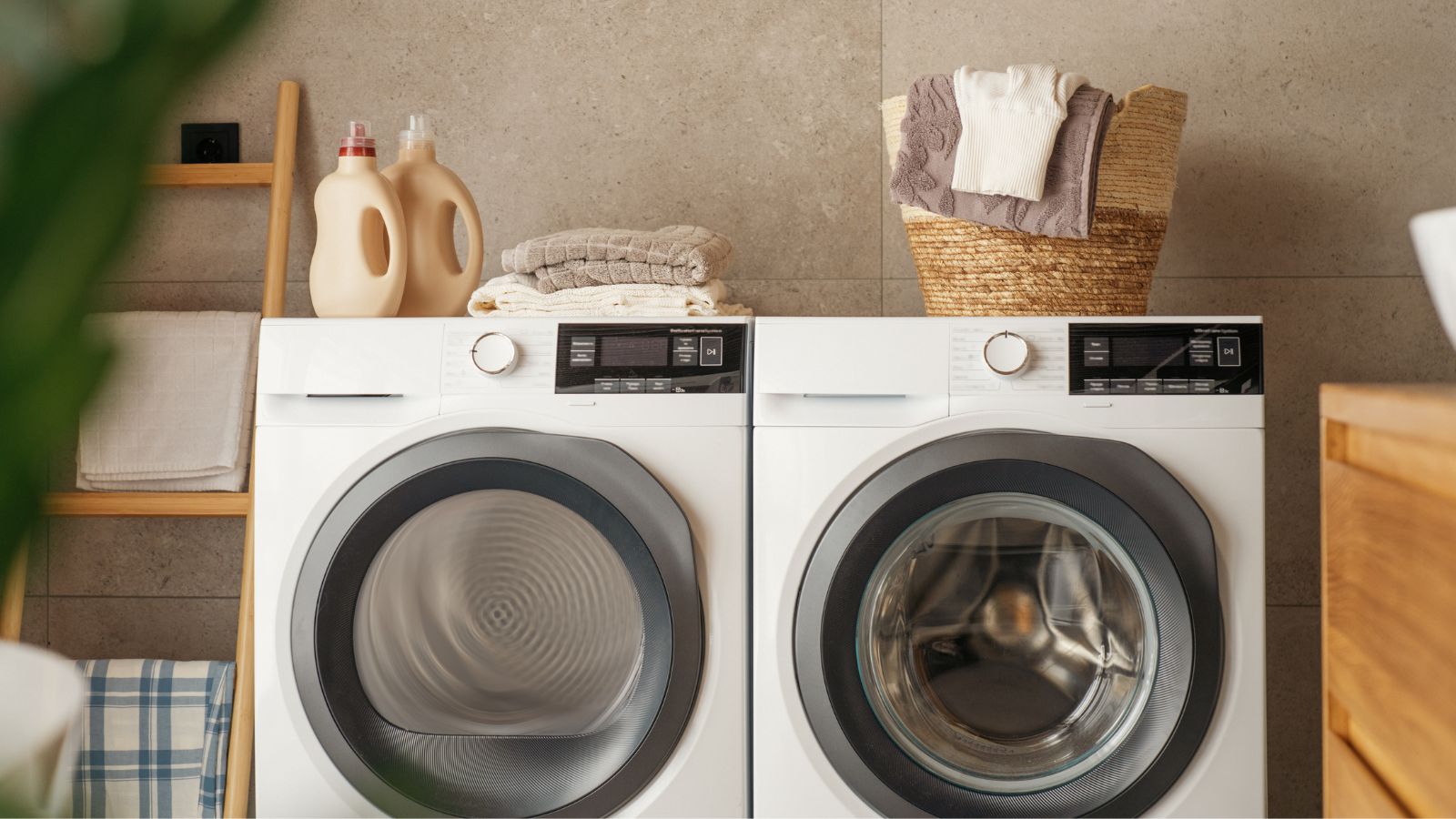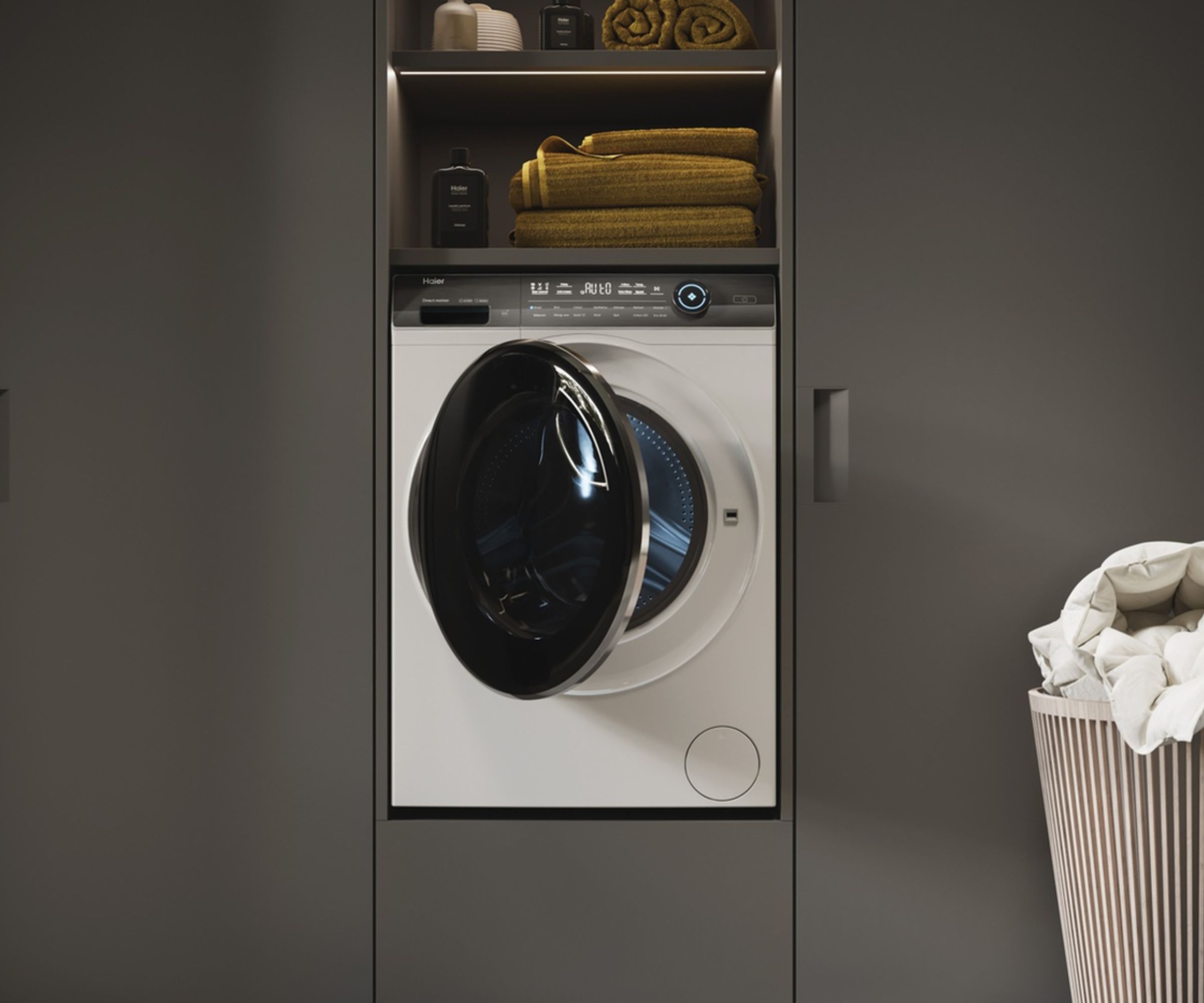
If your washer isn't draining or spinning, you'll know the frustrating feeling of your laundry being soaked after a wash. It's a harsh reminder that our appliances can break at any moment.
But luckily, it's probably a fixable issue. Even if you've been making big washing machine mistakes, you can troubleshoot the issue right at home and see whether you can avoid a callout charge.
To find out whether you can fix it yourself, read on to see a list of the potential reasons stopping your washer from working as it should be.
Why is my washer not draining or spinning?
The following are some of the most common causes for a washing machine not draining or spinning. We spoke to appliance experts to find out what to do next.

Clogged drain hose or pump
'Lint, small items, and debris can bunch up and block the water from exiting,' says Robert Walden, experienced mechanic, electrician, and appliance expert from Vehicle Freak. 'Clear any blockages to get things flowing again.'
Ievgen Ponomarenko, appliance repair account manager of Home Alliance adds, “If the drain hose or pump is clogged, you can try to clear the blockage by removing the hose and manually cleaning out any debris.”
If you feel up to the task, disconnect the washer from the power and water supply, remove the drain hose, and inspect it for blockages. Clean out any lint or debris you find, then check the pump for clogs and clear it if necessary. If you'd rather be on the safe side, call a qualified technician to take a look.
Design expertise in your inbox – from inspiring decorating ideas and beautiful celebrity homes to practical gardening advice and shopping round-ups.
Unbalanced loads
'Clothes packed in unevenly can trick sensors into thinking the spin cycle might be dangerous,' Robert explains. 'Take your time redistributing clothes so they're spaced out nicely.'
Open the washer and redistribute the clothes evenly around the drum. Avoid overloading the machine (there should be a max fill line), and try to mix large and small items to balance the load better.
Faulty parts
A common culprit for a washing machine not draining properly is a broken drain pump. 'If the part can't do its job emptying water, it's time for an upgrade,' says Robert. “A pro can swap it out, no problem.” If you suspect a faulty drain pump, it’s best to call a professional. They can diagnose the issue accurately and replace the pump if necessary.
Particularly in regards to the washer's spin, Ievgen agrees, noting that 'motor issues or problems with the timer or control board could be to blame. Motor issues often require professional intervention due to the complexity of the parts involved.'

Drain line blockage
Robert points out another potential issue: drain line blockage. He recommends to “check under the sink and use a bending wire to unclog any jams further down the pipes where you can't see.”
Inspect the drain line under your sink or where the washer’s drain hose connects to see if you can spot a clog. Wire is generally safe, but be sure to be cautious and not use too much force. Alternatively, a drain snake is designed for this exact purpose. You can find them online at Walmart in different sizes.
Malfunctioning lid switch or drive belt
'Another possibility is a malfunctioning lid switch, which can stop the machine from spinning if it is defective,' Ievgen suggests. 'The drive belt might also be broken or worn out, which would hinder the spinning function.'
If your washer doesn’t spin because the lid switch is faulty, you’ll need to replace it. This typically involves some disassembly of the washer’s top or front panel. Same goes for the drive belt: if it's broken or worn out, replace it. Find your washing machine model online to see which parts you'll need, and how to install them yourself.
For more complex problems involving the motor or control board, calling a professional is the safest bet. They have the expertise and tools to handle these intricate repairs.
Before you tackle any of the above advice, make sure you know what you're equipped to deal with. As Ievgen advises:
'Deciding whether to call a professional or attempt repairs yourself depends on your comfort level and experience with appliance repairs. Simple fixes like unclogging a drain hose or replacing a belt can often be handled by a handy homeowner with basic tools.'
And to keep your washer at its best for longer, remind yourself of the correct way to clean a washing machine, and how often you should clean your washing machine.

Dan is the Home Tech Editor for Homes & Gardens, covering all things cleaning, sound, smart home, and air treatment across the Solved section.
Having worked for Future PLC since July 2023, Dan was previously the Features Editor for Top Ten Reviews and looked after the wide variety of home and outdoor content across the site, but their writing about homes, gardens, tech and products started back in 2021 on brands like BBC Science Focus, YourHomeStyle and Gardens Illustrated.
They have spent more than 400 hours testing and reviewing vacuums, soundbars and air purifiers for Homes & Gardens.
Dan has a BA in Philosophy and an MA in Magazine Journalism. Outside of work, you'll find them at gigs and art galleries, cycling somewhere scenic, or cooking up something good in the kitchen.
